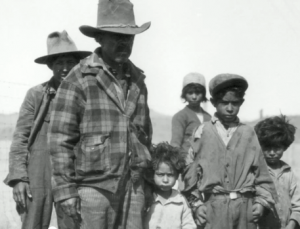CA Apology To Deported Mexican Americans 80 Years Too Late
 There are many parallels between what’s happening today with regard to immigration in America, and what happened 80 years ago during the Great Depression. The obvious comparisons are the economic downturns and their attendant consequences; 80 years ago the bottom fell out of the economy, and just a couple of years ago the bottom almost completely fell out, again. As a reaction to the crash of the 1930s, a series of stop-gaps were put into place to make sure that it never happened again, The FDIC and a slew of legislative nets were unfurled to save the banks and Wall Street from another precipice.
There are many parallels between what’s happening today with regard to immigration in America, and what happened 80 years ago during the Great Depression. The obvious comparisons are the economic downturns and their attendant consequences; 80 years ago the bottom fell out of the economy, and just a couple of years ago the bottom almost completely fell out, again. As a reaction to the crash of the 1930s, a series of stop-gaps were put into place to make sure that it never happened again, The FDIC and a slew of legislative nets were unfurled to save the banks and Wall Street from another precipice.
But there have been other consequences of the 1930s that have been slow to be addressed — and redressed. Every economic downturn, even the softest of recessions, brings with it the rise of immigrant scapegoating: the undocumented take jobs from unemployed Americans. There is no need for me to outline the present-day antagonism against immigrants, it’s a well known litany of headlines and boiling-point issues; but during the Great Depression the anti-immigrant sentiment was just as sharp, if not more so. According to a recent report in the examiner.com:
…nearly 2 million Mexicans and Mexican Americans…were forced to relocate south of the border during the Depression years. An estimated 400,000 U.S. citizens and legal residents were removed from California alone, following raids on Mexican-American communities who were constrained to abandon property, which was later sold to sponsor the cost for transportation to Mexico, (Los Angeles County Supervisor Gloria) Molina said.
I’ll repeat that, for the sake of emphasis: 400,000 U.S. citizens and legal residents were removed from California alone, their property seized and sold to pay for their removal. For almost 80 years the fact has simmered, dried and been forgotten, until this week, when what little could be done, was done.
“L.A. was very much part of these official roundups,” said Supervisor Gloria Molina. “There’s a point in time where the only thing you can do is offer an apology.”
In 2005 Governor Arnold Schwarzenegger signed a piece of legislation that apologized to the Mexican Americans who were separated from their families and forced, illegally, to go to Mexico. The County of Los Angeles finally came around to doing the same thing this week. A plaque will be unveiled to commemorate the apology.
Eighty years later the first thing I can think of saying is “it’s about time.” But there’s more to this than a mere recognition and apology. It would be like telling bankers and the American public “we’re sorry” for what happened to you so many years ago, but you’re still on your own. See, this apology points to the heart 0f the present immigration debate. The reason that the majority of Latinos feel strongly about the anti-immigrant movement in the U.S. is that the sentiment is all inclusive.
In real life, a backlash against Latino immigrants is a backlash against all Latinos — the plight of 400,000 citizens and legal residents is proof.
The point is that an apology is not the end; it’s just a second step in a long road to recovery. As in the financial stop-gaps put in place after the Depression, the first step is recognition. The question now is, what do we do to make sure it never happens again? What insurance do immigrants, their families and citizens who look like them have that they won’t be rounded-up, illegally, and removed form their homes?
This immigration debate we’ve been having is 80 years too old (in reality it’s more than 500 years old). So while an apology and a plaque are good things, they are only the first steps that have been a long time coming.
[Image By “A Forgotten Injustice“]
